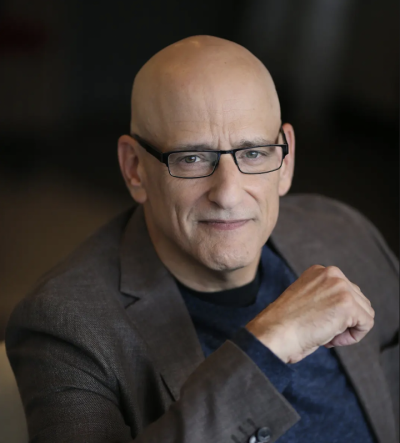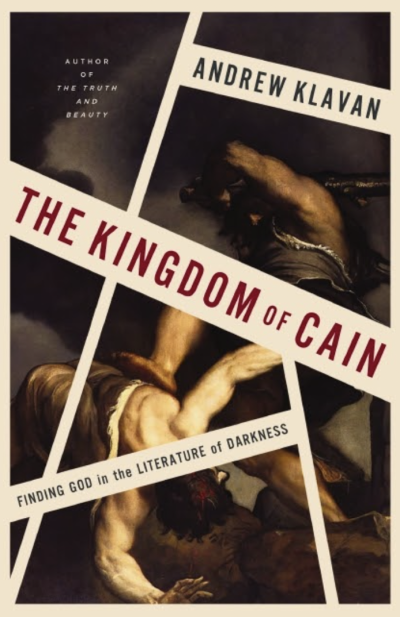
In the new book The Kingdom of Cain: Finding God in the Literature of Darkness, bestselling crime novelist and Daily Wire podcast host Andrew Klavan makes a provocative claim: horror helped lead him to Christ.
“When I was 19 years old, I was an agnostic. I read Crime and Punishment by Dostoevsky, a novel about an axe murderer. And I remember thinking, ‘There is no planet on which this cannot be evil.’ That moment forced me onto the road toward God,” the 70-year-old author said in a recent interview with The Christian Post.
For decades, Klavan, an award-winning crime novelist and screenwriter, has built his career exploring crime, corruption and human depravity through fiction. But with The Kingdom of Cain, he goes deeper, using real-life murders, including the biblical tale of Cain and Abel, to explore how art rooted in darkness can still lead toward divine truth and help Christians uncover the mind of Christ.
“Once it became known that I was a Christian, I started to get these letters that said, ‘You call yourself a Christian, but you write about these horrible things.’ And I always think: Yes, because this is what I see in the world. These are the dramas of human life,” he said.
True art, he said, must be rooted in truth, and yet, the modern Christian imagination too often sanitizes reality, focusing on an unrealistic portrayal of the world.
“It’s not true that if you pray, you always get what you ask for. It’s not true that belief in God erases grief or fear. The God I believe in is the God of this broken world. And faith has not made me more fragile. It has made me stronger,” he said.
“Modern Christian art is very bland. I have nothing against family-friendly art, but if that’s all you ever consume, you’re not prepared for the world. The arts should fill your heart with all human experience, so when you confront real darkness, you’re not surprised by it,” he said.

In The Kingdom of Cain, Klavan centers his reflections on three infamous murders that have repeatedly inspired artists. Alongside Cain and Abel, he delves into the crimes of Ed Gein, the real-life killer who inspired films like “Psycho” and “The Silence of the Lambs,” and the philosophical and literary legacy surrounding Dostoevsky’s Crime and Punishment.
“I was trying to get at how artists enlighten us when they reproduce darkness and make it beautiful. Because transforming darkness into light is, I think, what God does,” Klavan said.
“There’s so much wickedness in the world, so much darkness in the world, and yet, God doesn’t take it away. He doesn’t take your sufferings away. He doesn’t take the bad things that happen to you away, but he does make good of things. I think that that’s what artists try to do too.”
The subtitle of the book, Finding God in the Literature of Darkness, might seem paradoxical. But Klavan insists it’s precisely in these stories that one encounters the reality of sin, and by contrast, the possibility of redemption.
“Every murder is an act of evil. When you study them, you see how someone has detached themselves from God. These works of art can trace that separation and sometimes, the path back,” he said.
Klavan, the host of “The Andrew Klavan Show,” speaks from experience. Raised in a secular Jewish household, his exposure to moral relativism in college nearly derailed his moral compass, until art intervened.
“I was reading Dostoevsky, and even though the murder was fictional, it was so vividly wrong that it refuted the relativism I’d been taught. I didn’t know it then, but I was being pushed toward God,” he said.
One of the most powerful scenes in Crime and Punishment, he said, involves an axe murderer confessing to a prostitute.
“She says, ‘What have you done to yourself?’ That line and the pity in that scene brought me to tears. It showed that not only had he destroyed life, but he had detached his soul from God,” Klavan said.
“I remember reading that, and my eyes just filled with tears, because she recognizes that not only has he destroyed a life, but these lives are in God’s hands. They’re not going to be forgotten. He’s detached his soul from God. He’s detached his soul from its own source,” he continued.
“It was so illuminating and so brilliant that I would not have missed that moment for the world. It’s only in studying the darkness, I think, that you find this greater design. If all you look at is the good, if all you ever think about is the happy things that happen in life, and every time something bad happens, you think, ‘Well, you know, God will take care of it, and all things turn to the good, to those who love God’ and so forth, I don’t think you can see just how beautiful and complex the design of the world is.”
Klavan emphasized that beauty is not incompatible with horror; in fact, he believes beauty might be the best answer to the problem of evil.
“The most beautiful sculpture I’ve ever seen is Michelangelo’s ‘Pieta,’ which is a picture of the saddest thing imaginable: a mother holding her dead son. And yet, it’s beautiful. If a man can make something so beautiful out of that, imagine what God can do with our tragedies in eternity,” he said.
When it comes to media consumption in a Christian’s life, Klavan defended the value of horror in mainstream entertainment, provided, he posited, that it’s truthful.
“There absolutely is a place for horror in the life of a Christian. I think ‘Psycho’ is a horror film of extreme beauty. I recently saw ‘A Quiet Place’ and found it terrifying and yet uplifting. A scene of a woman giving birth while monsters stalk her house gave me a deeper appreciation for motherhood,” he said.
Not every piece of horror is worthwhile, he acknowledged, but when done well, it offers the experience of fear without real danger.
“No monster is going to come out of the screen and eat you. That’s the gift of art. It gives you intense experiences without endangering you. And if it tells the truth, it will speak of God,” he said.
That belief, that truth and beauty ultimately point to God, underpins Klavan’s latest book. His journey toward that faith, ironically, was even shaped by evil. As a young man, he flirted with atheism and read secular philosophy extensively, including the works of the Marquis de Sade.
“He said, if there’s no God, there’s no morality, so do as you please. And if you do as you please, strong people will abuse weak people. That actually made sense. But it was a picture of Hell. And I thought: If that’s the road atheism leads to, I’m going home another way,” he said.
These moments, Klavan contended, demonstrate that even art created with evil intent can reveal the truth if it refuses to lie.
“Art is a two-way street. It’s a relationship between the creator and the audience. If you engage it as entertainment alone, you might miss it. But if you come to it searching for truth, it can change you,” he said.
With his previous book, The Truth and Beauty, Klavan reflected on how the work of English romantic poets help illuminate the truth of the Gospels. Though a darker theme, the author said he hopes The Kingdom of Cain will help readers see faith as resilient rather than fragile.
“I hope people walk away realizing their faith can withstand anything, even the worst the world can throw at them. And I hope they see that beauty itself is part of the answer to the question of suffering,” he said.
Though he sees much of contemporary Christian art as “inauthentic,” Klavan said he believes becoming a Christian, which occurred for him at the age of 49, has improved his writing. Today, he still writes dark fiction, but it’s grown more redemptive.
“I prayed, ‘Please don’t make me a Christian novelist,’ because I thought Christian novels were so bad. But ironically, my outlook became darker once I understood sin. And yet, my heart became more serene and joyful. My wife even said, ‘You’ve changed,’” he shared.
“My work didn’t get brighter or dumber. But now it exists in a moral atmosphere. I think it’s better than ever. I don’t preach. You won’t find sermons. But you will find truth.”
The Kingdom of Cain is now available.
Leah M. Klett is a reporter for The Christian Post. She can be reached at: leah.klett@christianpost.com


















